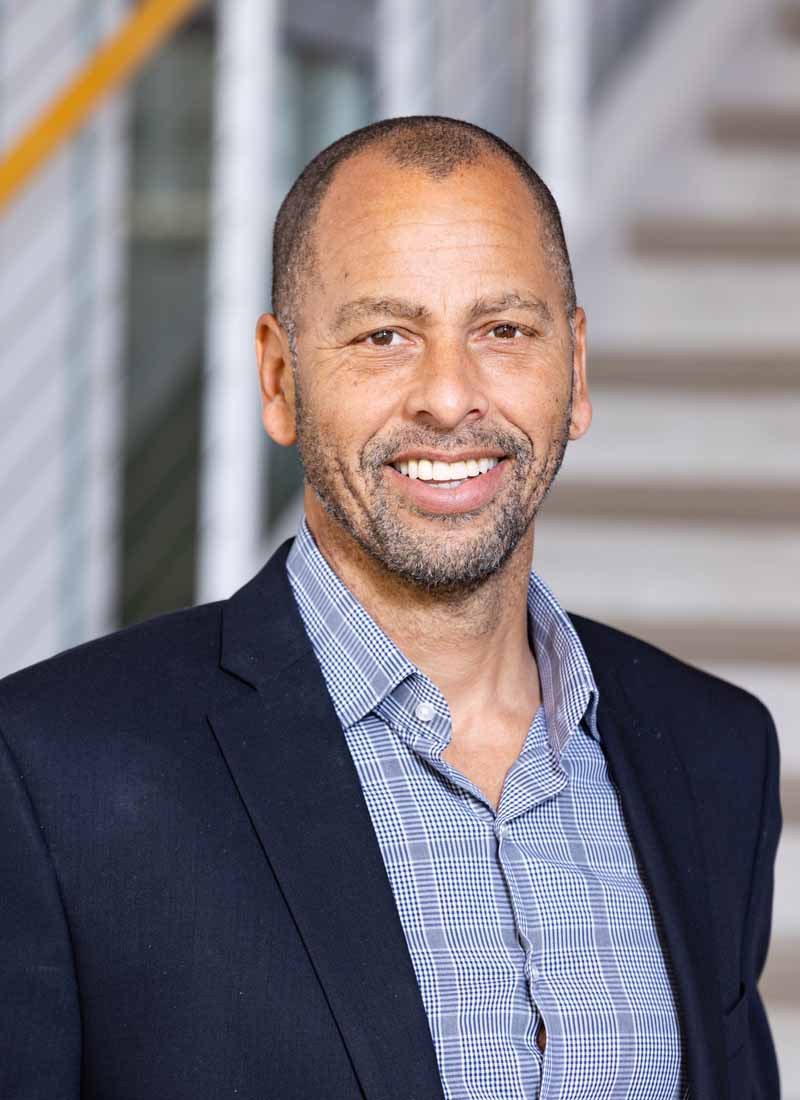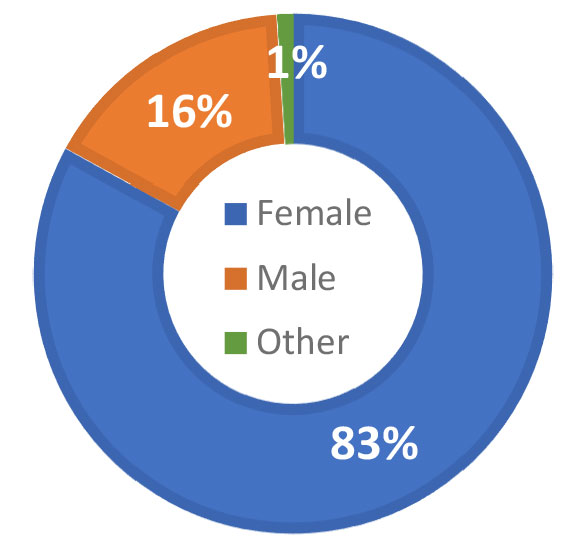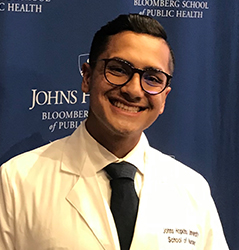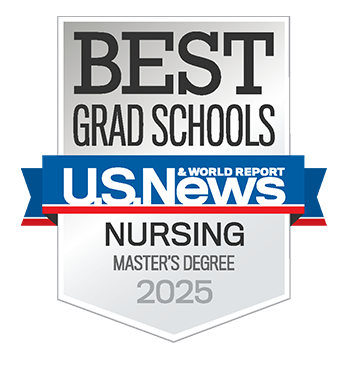Master of Science in Nursing (MSN): Entry into Nursing Program
Need your questions answered?
Updated Curriculum Information for Fall 2026.
Spring 2026 MSN Entry into Nursing Applicants view current curriculum information below.
OVERVIEW
Jumpstart Your Career
Students with a bachelor’s degree in another discipline who want to pursue a nursing career can enroll in a full-time graduate program to earn a Master of Science in Nursing (MSN). Unlike traditional programs, the MSN Entry into Nursing program emphasizes leadership, global impact, quality and safety, and evidence-based interprofessional education. You will learn from a framework that integrates the humanities, public health, genetics, and physical and organizational sciences into nursing practice.
Graduates will receive enhanced bedside nursing education and training and the necessary tools to advance into a leadership role or continue toward a doctoral degree. They will be prepared to take the nursing licensure exam (NCLEX) and be licensed as an RN. Students will have opportunities to explore their areas of interest, including global health, research, quality and safety, and practice in many specialty areas.
“We’re trying to prepare practice-ready nurses for as many diverse nursing roles as possible.” Robert Atkins, PhD, RN, FAAN
Robert Atkins, PhD, RN, FAAN
Program Details
Tuition & Fees
Estimated Tuition Cost: $1,995 per credit See Cost of Attendance Details
Financial Aid: There are numerous options for financing your education including grants, scholarships, federal loans, and employment programs. Learn more.
Upcoming Application Deadlines
Fall entry: Nov 1, Jan 15
Spring entry: Jul 1, Oct 1
INside, OUTside
The future of nursing is IN homes and schools, OUTpatient settings and INpatient acute care. At the Johns Hopkins School of Nursing, we’re empowering nurses to meet patients where they are, advance health equity across settings, and champion the shift toward whole-person, community-based care.
Inside the Outside Track
Students in this track are the first in the nation to become nurses through clinicals that take place entirely outside of the hospital setting. A small number of students interested in community health gain hands-on experience in outpatient settings like community-based health centers, senior living facilities, and work one on one with preceptors to provide access to primary and preventive care.. This approach prepares students for diverse roles outside of hospital settings. Community partners value these graduates, who are ready for outpatient roles prioritizing holistic, patient-centered care.
Requirements
Admission Criteria
Bachelor’s Degree (in a discipline other than nursing) from a regionally accredited college or university or an equivalent degree from a comparable foreign institution
Scholastic GPA of at least 3.0 on a 4.0 scale from an accredited college or university
3 Letters of Recommendation (2 academic and 1 professional)*
Official Transcripts (from all previous colleges/universities)
GRE scores are accepted but not required
One written essay
Virtual Interview/Video Essay
Current Resume
Information for applicants with international education
*References should be recent, written for the purpose of your application to this program and from professors who know you as a student or employers who know you as a professional in a job setting preferably in a supervisory role. Personal references from colleagues, friends, or family members do not meet the requirement.
Prerequisites
In addition to a bachelor’s degree in a non-nursing field, applicants must complete 17-21 credits (grade B- or better) of prerequisite coursework from a regionally accredited college or university.. Students who have not taken their prerequisites can take them all online at Hopkins Nursing.
Applicants can be working on prerequisite coursework while applying to the program. Coursework must be completed and final transcripts submitted prior to starting the Master’s Entry program.
Anatomy with lab OR Anatomy and Physiology I with lab1 (3-4 credits)
Human Growth and Development Through the Lifespan2 (3 credits)
Microbiology with lab (3-4 credits)
Nutrition (2-3 credits)
Physiology with lab OR Anatomy and Physiology II with lab1 (3-4 credits)
Statistics3 (3 credits)
1 Anatomy with Lab must be taken with Physiology with Lab to meet the requirement OR Anatomy and Physiology I with Lab must be taken with Anatomy and Physiology II with lab to meet the requirement. Course formats cannot be mixed or content will be missed (i.e., A&PI with lab cannot be combined with Anatomy with lab to meet the prerequisite requirements).
2 Course content must cover the full lifespan—from conception (birth) to death—in order to meet the requirement.
3 Topics should include correlation and linear regression; experimental design such as t-tests, analysis of variance and chi-square; suggested departments: psychology, sociology, education, biology, and mathematics. Statistics courses offered by business, management, and economics departments are typically more theory-based and lack the experimental design component.
U.S. immigration regulations require that students needing an F-1 visa must successfully fulfill all prerequisites before an I-20 can be issued. To allow sufficient time to complete all the steps in the visa process, students must submit an official transcript or official course by course evaluation with final grades (B- or higher) for all prerequisite courses to the Office of Admissions at least 3 months prior to the beginning of the term in which they wish to begin studies (October for spring term; May for fall term).
MSN Entry profile based on Fall 23 cohort
30%
Underrepresented Minority

83% Female/16% Male/1% Other
29%
First Generation
20
Countries Represented
29
States Represented
25
Average Age
90%
Received Scholarship Support
Curriculum
Professionalism for Nursing in Health Care (3)
Foundations of Nursing Practice (3)
Integrated Clinical Management: Common Health Alterations (4)
Health Assessment I (3)
Pathophysiology I (3)
Community Outreach to Underserved Communities in Urban Baltimore (1)
Integrated Clinical Management: Chronic Health Alterations (4)
Pharmacology (3)
Biostatistics for Evidence-Based Practice (3)
Promoting Health in Older Adults (3)
Health Promotion and Risk Reduction Across the Lifespan (2)*
*This course is offered in Fall semester for cohorts that begin in Spring.
Integrated Clinical Management: Complex Health Alterations (4)
Leadership for Professional Nursing (3)
Psychiatric Mental Health (3)
The Research Process and its Application to Evidence-Based Practice (3)
Nursing the Childbearing Family (4)
Child Health (4)
Population and Public Health Nursing (4)
Philosophical, Theoretical and Ethical Perspectives of Advanced Nursing Practice (3)
Context of Health Care for Advanced Nursing Practice (3)
Integrated Clinical Management: Synthesis Practicum (6)
Nursing Specialty Elective(s) (at least 3 credits)
* Transfer Credits from the JHSON MSN (Entry into Nursing) Program to the DNP Advanced Practice Track can vary based on current curriculum & start date.
“My personal ambition of doing more than what is expected leads me to pursue a program that encourages its future nurses to challenge themselves in providing the highest quality of care on a global level.” Kash Calderon
Kash Calderon
Engage with Us
Join us soon for a tour, on-campus event or a virtual visit.
Request Information
Speak with Admissions to learn more about our programs.
Virtual Info Sessions
See recordings of some of our recent virtual info sessions.
Tuition & Other Costs
Financial aid
View the costs for the Master of Science in Nursing (MSN) Entry into Nursing Program.
MSN Entry into Nursing (Fall 2024 start)
MSN Entry into Nursing (Spring 2025 start)
MSN Entry into Nursing (Fall 2025 start)
MSN Entry into Nursing (Spring 2026 start)
Scholarships: The School of Nursing sets aside funds for students who demonstrate strong academic ability, leadership skills, outstanding community service, and other personal strengths and accomplishments. These merit and need-based awards are granted for outstanding achievement and leadership potential. Each student is considered upon applying for admission. Scholarships range from $5,000 to full tuition. Learn more.
Loans: Many students will avail themselves of loans to help finance their School of Nursing education. If necessary, we encourage you to borrow only what is absolutely essential to cover your educational costs. Learn more.
Employment: Many students locate part-time employment to help pay education expenses. Numerous positions are available on campus and within various community based organizations. These jobs provide students with opportunities to gain practical work experience. Most positions are funded through the Federal Work-Study Program. Learn more.
Frequently Asked Questions
With your MSN degree in hand, you will be able to sit for the NCLEX. Once you obtain your RN licensure, you can continue your studies in advanced nursing practice or begin employment as a RN.
Many leadership and teaching roles within healthcare require at least a master’s degree in nursing in addition to an RN license. The masters-level education gained from this program will enable you to access these expanded nursing roles more quickly compared to earning a baccalaureate degree. You will also be academically prepared to pursue an advanced nursing degree (e.g., NP, DNP, CRNA) or nursing research degree (PhD).
No. This program is accelerated and requires a full time, on-site commitment.
Yes! The school has several financial assistance programs that may include scholarships, grants, work-study, and loans.
GRE scores are accepted but not required for the MSN (Entry into Nursing) Program.
Students become eligible to take the NCLEX after they complete their selected program in its entirety.
The JHUSON offers two doctoral programs for those interested in continuing their nursing education.
• The Doctor of Philosophy (PhD) program prepares nurse scholars to develop and conduct scientific research that advances nursing practice, healthcare, and health. The PhD Program will accept up to 15 credits to be transferred into the PhD program directly from the JHUSON MSN Entry into Nursing program.
• The Doctor of Nursing Practice (DNP) program prepares nurses at the highest level of professional nursing practice for advanced roles as clinical and healthcare policy leaders. The DNP Program will accept up to three courses to be transferred into the DNP Advanced Practice Track directly from the JHUSON MSN Entry into Nursing program.
Current clinical sites include locations in Baltimore city and within a 60-mile radius from the school. .
You will be assigned a clinical placement for your first clinical course. You may be able to provide input on preferred sites in subsequent semesters; however, we cannot guarantee preferred site placement.
All students are responsible for their own transportation to and from their assigned clinical sites. Some clinical sites are not served by public transportation and are located within a 60-mile radius of the school.
IWe recommend but do not require that prerequisites be completed within the last five years.
No. Prerequisites do not need to be completed by the time you apply but must be completed by the time the program starts.
The Admissions Committee can accept an applicant who still has courses pending on the condition that they complete all pending courses with a B- or better.
U.S. immigration regulations require that students needing an F-1 visa must successfully fulfill all prerequisites before an I-20 can be issued. To allow sufficient time to complete all the steps in the visa process, students must submit an official transcript or official course by course evaluation with final grades (B- or higher) for all prerequisite courses to the Office of Admissions at least 3 months prior to the beginning of the term in which they wish to begin studies (October for spring term; May for fall term).
Similar to an in-person interview, you’ll be asked 3 questions, one from each of three main themes: Motivation, Teamwork, and Cultural Humility. You’ll have 60 seconds of prep time after being asked the question, and 90 seconds to respond.
You must complete the video interview in one sitting on a day and at a time convenient to you. It will take about 20 minutes to complete.
We appreciate and value your natural, authentic, honest responses. Feel free to check out our Admissions Workshops webpage for additional tips for submitting your application.
